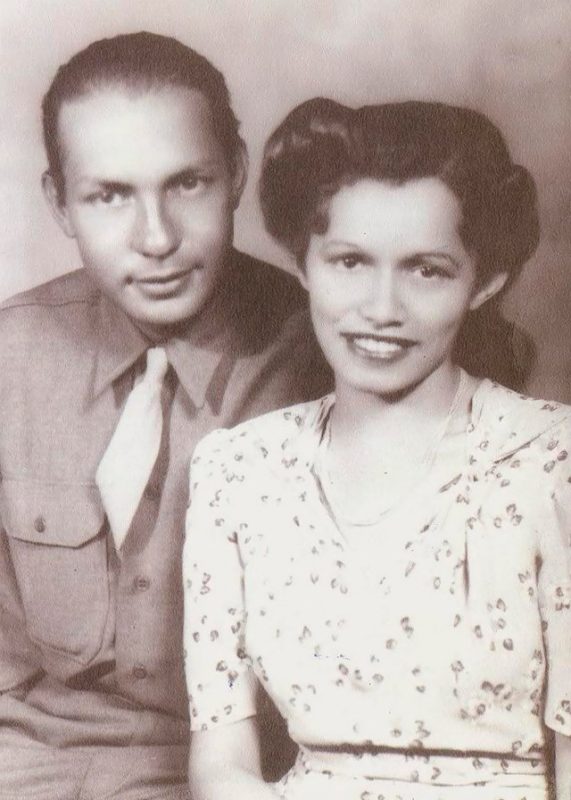Friday, August 25 was the centennial birthday of Esther Cooper Jackson. An activist and intellectual, Esther Cooper Jackson’s life and career in the public led her to rub shoulders with figures such as W.E.B. Du Bois and Paul Robeson. Jackson also shows the links between the Civil Rights Movement and the American left from the 1930s through the 1970s. As a co-founder of the journal Freedomways, Jackson also played a critical role in African American intellectual history. In short, she’s someone who should be studied more. I’m going to use my post to first talk about why she matters to intellectual history, then explore how she can be further incorporated into narratives of American intellectual history.

James and Esther Cooper Jackson.
When we think of truly “lifelong” activists, Esther Cooper Jackson should come to mind. She was involved in civil rights and left-wing movements from an early age. Her mother was president of the Arlington, Virginia branch of the National Association for the Advancement of Colored People. Her master’s thesis, written at Fisk University, was titled “The Negro Woman Domestic Worker in Relation to Trade Unionism.” It’s interesting to consider the role in which contemporary politics plays in the choices made by people in what they write about to satisfy thesis or dissertation requirements—I cannot help but compare this to C. Vann Woodward’s decision to write about the populist, and later anti-Semitic demagogue, Tom Watson for his dissertation. Both works were written at the height of the Great Depression when numerous Americans asked difficult questions about the future of capitalism.
Esther Cooper Jackson gradually took on a leadership role in the Southern Negro Youth Congress (SNYC), a left-wing, anti-racist organization that functioned from 1937 until it was forced to disband thanks to the Second Red Scare in in 1949. SNYC actually has an important role to play for intellectual historians. We can see through that organization the links between the left and the civil rights organizations as they began to organize and agitate at the start of what has been referred to as the “long civil rights movement.” Living and working here in Columbia, South Carolina I was lucky to witness the 70th anniversary ceremonies for the “Behold the Land” speech by W.E.B. Du Bois here—done at an event hosted by the SNYC and featuring Esther Cooper Jackson. You can’t think about the long civil rights movement without considering groups like SNYC. And, frankly, it would be a mistake to think about SNYC without considering the leadership of Esther Cooper Jackson.
Her marriage to James Jackson brought her deeper into the orbit of left-wing and civil rights organizations. James Jackson was also involved with SNYC, fighting for tobacco workers’ rights in Virginia in 1937. Further, James Jackson was also well-regarded as a Marxist theorist in his own right. He wrote about, and was involved in numerous debates on, the position of Communism on the “Negro Question” of the 1930s and 1940s. In that context that it should not be surprising that Esther Cooper Jackson—herself well versed in Marxist theory and the debates among American leftists about race and class—would go on to help found Freedomways magazine in 1961.

Cover of the pamphlet version of W.E.B. Du Bois’ “Behold the Land” speech.
Her leadership at Freedomways, a bastion of American leftist thought from its publication in 1961 until its demise in 1985, was critical to creating a journal devoted to thinking about race in both a national and international context. Writing the introduction to the edited collection of Freedomways essays that appeared in 2000, Jackson reflected on why the journal mattered: “…By lifting our collective voices, Freedomways helped advance the African American freedom struggle.”[1] This essay is actually worth a read—she writes about the advice W.E.B. Du Bois gave her on how to successfully found and fund a journal (Du Bois himself had been involved with the creation of Crisis magazine for the NAACP and, later, with the scholarly journal Phylon at Atlanta University in 1940). Jackson also delves into the many areas of struggle and intellectual protest Freedomways featured—from civil rights in the U.S. south, fighting against anti-leftist backlash in the United States, to embracing the causes of feminism and international solidarity in the 1960s and 1970s.
Esther Cooper Jackson is already receiving considerable attention from historians of African American intellectual history. Books such as Sara Rzeszutek’s James and Esther Cooper Jackson: Love and Courage in the Black Freedom Movement showcase her importance to the left-wing of civil rights historiography. More intellectual historians of the American left—and of the United States in the twentieth century—will over time begin to fold into the larger, grand narratives of race and American intellectuals the stories of groups like SNYC and, by extension, Esther Cooper Jackson. Having someone like Jackson still with us is a rare treat, and her importance to the history of civil rights and left-wing protest in American history should not be underestimated.
Notes
[1] Esther Cooper Jackson, “Introduction,” Freedomways Reader: Prophets in Their Own Country. Pp. xxi.

0